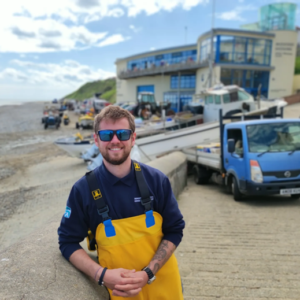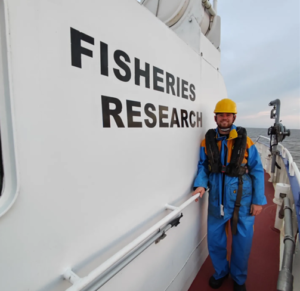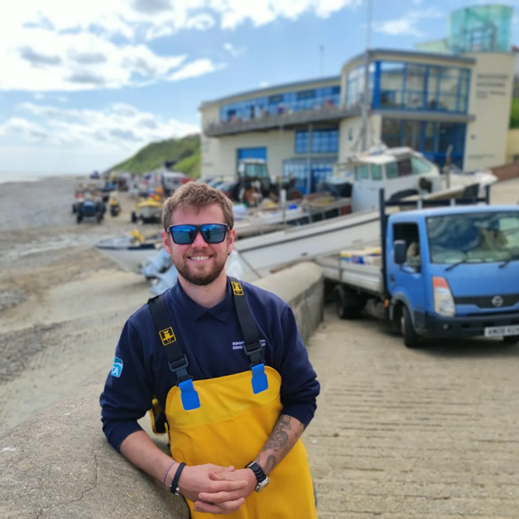We are looking at the achievements of our MSc graduates who have excelled in marine science around the world since studying with us. Today we meet Fletcher Noble, MSc Marine Vertebrate Ecology & Conservation graduate (2021) and now a Marine Science Officer at Eastern Inshore Fisheries and Conservation Authority (Eastern IFCA).

What did you enjoy most about studying at the University of Exeter?
It’s hard to narrow down, but I would say the lecturers were excellent! They have the ability to engage you and grow your interests in topics that you may not have given much thought to previously. Their ability to engage you and draw your attention for an entire lecture really motivates you to go and do that extra work to learn more about the subject in your own time. It made learning the course easy and enjoyable.
What were the best aspects of studying your course?
As I mentioned previously the lecturers were excellent, but the field courses and the experiences they provided were absolutely top tier. From local trips on the waters and lands around Falmouth and then big trips further afield.
Having also studied my undergraduate degree here at Exeter, the undergraduate trips to Wales and the Azores gave me great practical experience and the chance to see wildlife I would never have seen – like 40 sperm whales in a single day! During my masters they had provided additional qualifications too, such as becoming a WiSe Accredited Wildlife Safe Operator, BDMLR Mammal Medic, and JNCC Marine Mammal Observer.

What skills and experiences did you gain that will/have been useful for job/internship applications?
I think the research projects I undertook during my studies provided a whole range of skills that have become relevant in my current job. Being able to take part in active research within the conservation field, tackling the challenges which come with it, and overcoming them by developing a greater understanding of the statistical analysis software RStudio, statistics as a subject and managing databases, along with planning and executing it within a project were critical in securing my role.
Why did you choose to study at the University of Exeter?
I chose the University of Exeter because it was a top-tier Russell Group University, with a particular focus on conservation and the marine realm, and as an added bonus, I could study at the Cornwall campus! Having visited the Duchy many times throughout my childhood, I jumped at the chance to live and study in such a beautiful and fun part of the country.
Do you think there are any factors that make the University of Exeter a unique place to study?
I would say the lifestyle and experiences that come from living in Cornwall certainly make it unique. Living within a stone’s throw away from multiple gorgeous beaches and being able to go for a quick afternoon swim after studying really revitalises you. Then going to one of the many excellent pubs for a pint with friends to warm up and relax after drying off. There aren’t many places where you can do all of that in the UK, especially not under the Cornish sunshine!

What skills and experience have been most useful for your career? And how do you think your programme prepared you for your career/current role?
I think my ability to manage both my time and work while being involved in big projects has really helped. In my current role, I am participating in (and now leading!) multiple projects at the same time, from new research to the constant environmental and stock monitoring that comes with fisheries management. My master’s thesis really helped prepare me for this, it was a large database project which had two big tasks within it. Being able to balance multiple sets of information, of equal importance, and be able to complete both to a high standard has likely been one of the most important, (if slightly less flashy) skills I have gained from my studies.
Why did you choose this career?
Since graduating I wanted to follow a career that would give me the opportunity to partake in active research and practical conservation. This has been a tricky mix to find, especially as a graduate! But the IFCAs provide exactly that! Eastern IFCA gives me the opportunity to do that in spades and more! Since joining I have undertaken cockle surveys in The Wash aboard R.V. Three Counties, performed monthly environmental health observations, and started my own research project examining the economic benefits of the unique chalk reef at Cromer. I am especially happy with this last one, as the area is currently at the heart of practical conservation and fisheries management. It’s a prime example of the work that can be done through co-management of fishers, conservationists, with IFCA at the core, to protect both the unique habitat and those who earn their lifestyles by fishing those grounds.

What advice would you give to a current student who wishes to pursue your career?
I would say be open to unexpected opportunities and then chase them with full enthusiasm! I was teaching scuba diving in Sri Lanka when I saw my role advertised, I applied on a bit of a hopeful whim and am now loving my new job! By having enthusiasm for your studies, you will gain a wide range of knowledge and experience, but you must make sure not to put the blinders on afterwards. You will be capable of almost anything when you carry that enthusiasm forwards to your career and welcome new opportunities with open arms!

What are your plans for the future?
In the immediate future, I plan to stick with my role at Eastern IFCA, but I would eventually love to complete a PhD! Either here in the UK, or back in Australia where I took my study abroad year. In the meantime, I plan to keep learning and experiencing new things in my role, like using side-scan sonar and flying an underwater remotely operated vehicle!
What advice would you give to anyone thinking of applying to the University of Exeter?
Do it! You won’t regret it! The only bit you will have trouble with is deciding what you love more, studying in Penryn or the Duchy itself! One thing I am 100% confident of is that you won’t regret it!

